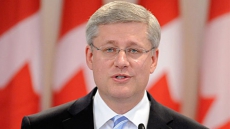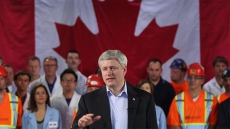TORONTO — Wind turbines generally have little effect on the value of nearby properties with possibly isolated exceptions, a recent study of thousands of home and farm sales has found.
The surprising findings, published in the Canadian Journal of Agricultural Economics, come amid an already fiery debate over wind farm impacts and appear to contradict widely-held views among turbine critics.
The study focused on Ontario's Melancthon township — home to one of the country's oldest and largest wind farms — and surrounding areas.
"The lack of significant effects of the Melancthon wind farm is somewhat surprising, given the public outcry regarding the construction of these turbines," according to the authors.
"These results do not corroborate the concerns raised by residents regarding potential negative impacts of turbines on property values."
The University of Guelph researchers analyzed more than 7,000 home and farm sales that occurred between 2002 and 2010 in Melancthon Township, which saw 133 turbines put up between 2005 and 2008, and 10 surrounding townships. Of those, more than 1,000 homes and farms were sold more than once, some several times.
"These turbines have not impacted the value of surrounding properties," co-authors Richard Vyn and Ryan McCullough conclude.
"Further, the nature of the results, which indicate a lack of significant effects, is similar across both rural residential properties and farm properties."
Vyn said he found the results somewhat surprising given the frequent and public criticisms of turbines.
Despite the overall findings, believed to be the first peer reviewed research on this issue in Canada, the study did find some limited support for those who believe wind farms hurt property values.
One appraiser's report found the values of five properties close to turbines — bought and resold by wind farm developers — plunged by more than half, the researchers note.
In addition, homes or farms that may not have sold because of nearby turbines don't show up in the sales data.
Several previous studies have also found turbines have little impact, while some others have concluded the opposite.
The debate around wind farms in Ontario is becoming increasingly bitter. Opponents, who argue turbines can make nearby residents ill, are waiting for the courts to rule on their constitutional challenge to the approvals process.
Dave Launchbury, who has been selling real estate in Melancthon 100 km northwest of Toronto for seven years, said there appears to be a growing stigma attached to properties near turbines. Many potential buyers won't even look at them, he said.
Launchbury estimated properties close to turbines sell for "at least" 10 per cent less.
One recent study found that perception around the impacts of turbines might contribute to lower property values.
"Assumed property degradation from turbines seems to lower both asking and selling prices," according to the University of Western Ontario study published late last month.
Vyn, a professor with Guelph's department of food, agricultural and resource economics, said he wanted to extend the research to other areas of the province and use later data to see if the initial findings hold up — especially given the increasingly vitriolic opposition to turbines.
"As people hear more and more about the concerns, I wonder if that will show up in more recent property sales transactions," Vyn said in an interview.





